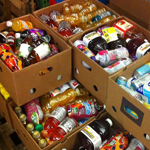Latest News at FTF
FTF Allocates $117M in Early Childhood Funds to AZ Communities
 Sometimes, it's tough to see the benefits of our tax dollars in our communities. But, with First Things First, Arizona's neighborhoods can see the impact voter-approved early childhood funds are having on young kids in their area. Sometimes, it's tough to see the benefits of our tax dollars in our communities. But, with First Things First, Arizona's neighborhoods can see the impact voter-approved early childhood funds are having on young kids in their area.
This month, communities were allotted their share of these funds for the coming year – more than $117 million statewide. Now, regional councils made up of community volunteers will study the needs of their area and decide what strategies to fund to improve outcomes for kids 5 and younger in their community.
Why are these funds so important?
- They fund what works. Research demonstrates that children exposed to high quality early education programs have better language math and social skills and better relationships with their classmates. They are more likely to graduate and go to college. And, as adults, they will be healthier and earn more.
- They help kids meet our state's high expectations. Kids who are healthy and have had meaningful interactions with all the adults in their lives arrive at kindergarten ready to meet Arizona's standards so they can be ready for college and careers later on.
- They prevent costlier problems later on. Helping kids prepare for school saves money on costlier remediation programs. Increased graduation rates save employers the high cost of re-training programs. And, when more kids go on to college and higher paying jobs, it saves taxpayers money on social welfare and criminal justice programs – funds that can be used for other pressing needs.
Because of First Things First programs, in the past year alone:
- 14,121 infants, toddlers and preschoolers received scholarships to access early education programs;
- 46,228 kids have access to a higher standard of child care;
- More than 35,000 screenings were done and fluoride varnishes were applied to prevent dental disease; and,
- 62,865 parents and caregivers were able to access community-based classes on brain development, early literacy, dealing with challenging behaviors and nutrition.
First Things First helps give young kids throughout Arizona the tools they need to be successful in kindergarten and beyond. And that's good news for our communities and our state!
It's the Most Wonderful (Learning) Time of the Year
By Sam Leyvas, Interim CEO
The holidays are a very busy time of year for many families. But for the parents and caregivers of children 5 and younger, holiday traditions – and our children's questions about them — offer a host of opportunities to expand children's learning.
Recently, a colleague shared how a simple question from her 5-year-old about the family's tradition of making tamales one weekend each year turned into a 15-minute conversation that included how the tradition got started, how it has evolved over the years and a vocabulary lesson in Spanish. 
Asking questions is one of the primary ways that young children learn about the world around them. Experiences that seem basic, routine or even dull to us are full of wonder to a young person who is experiencing them for the first time, and their questions are a reflection of that curiosity.
Early childhood expert Peter Mangione, Co-Director of the WestEd Center for Child and Family Studies, says that showing genuine interest in a child's questions and responding to those fully does more than give kids information, it shows young children that what matters to them is important to their caregivers, too.
Here are some helpful hints for turning holiday experiences into learning opportunities with young children:
- Give children more information than they ask for. When you respond fully to a child's question, it can lead to more questions, thus expanding their learning.
- Look for opportunities to grow their vocabulary. When you use new words be sure to point out to your child what they mean.
- If your child shows a deep interest in a topic or tradition, offer to look through family photo albums, talk to additional friends or family members about it, or help them find books you can read together about it.
- And, let your child determine when the conversation ends. Once they have lost interest, don't force it. But, be prepared, their interest could return at any time.
By building on our children's curiosity about holiday happenings, we not only help them build their knowledge and experience, we may re-discover our own wonder in holiday traditions, too!
Partner News
Food Banks Need Help During Holiday Season
 Did you know that almost 1 in 5 Arizonans – including about 30% of all children – are food insecure, meaning that they may not know where their next meal is coming from? Did you know that almost 1 in 5 Arizonans – including about 30% of all children – are food insecure, meaning that they may not know where their next meal is coming from?
There are public programs to help some families get enough to eat, but many in our communities don't qualify for those programs. Arizona's food banks play a critical role in filling that gap, especially for kids.
Throughout the year, food banks struggle to keep up with this need. With the holidays approaching, the needs will increase. We can all help by donating food or funds to our local food bank or pantry. The Association of Arizona Food Banks website, www.azfoodbanks.org , has a wealth of information to help you find the food bank closest to you, explore donation options, and inform you about tax credits that may be available to you for donating to an organization that helps the working poor.
The healthy development of a child's brain depends, in part, to getting adequate nutrition. In fact, studies have demonstrated that the effects of some nutritional deficiencies on the human brain – such as iron, iodine and protein-energy – during pregnancy and in the first few years of life may be permanent.
Kids who don't get enough healthy food are at risk for delayed development and learning difficulties in the first two years of life. As they enter kindergarten, these children may develop reading and math skills slower than their peers. They may also be at risk for an array of social and behavioral problems later in life, including tardiness, truancy, fighting, hyperactivity and bullying.
Arizona's food banks support the healthy development of our kids' bodies and their brains. Let's help them send our children to school prepared to succeed!
|